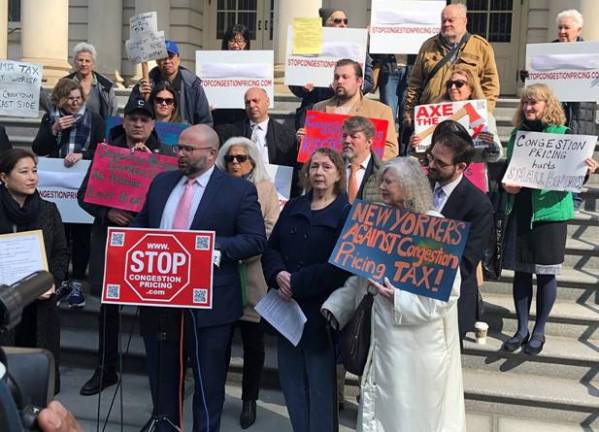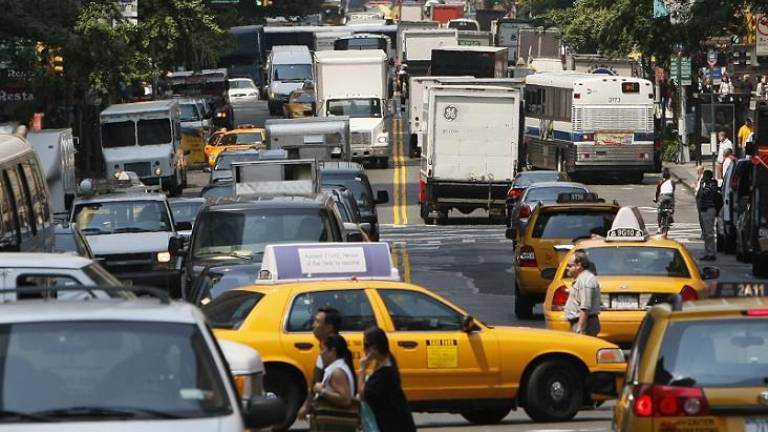Deep Divisions in Hearings Over Congestion Pricing as Opponents and Boosters Battle
Car-owning residents in the zoned-off area, firefighters traveling between stations, and medical care professionals all expressed concern over the effect of congestion pricing on certain groups of people, though some of them also expressed support for the policy in a broader sense.
Deep divisions between boosters and bashers were seen Feb. 29 as the MTA kicked off the first of its four public hearings over the controversial congestion pricing toll that it wants to initiate within the next few months.
At an occasionally raucous MTA hearing on day one more than a hundred students, workers, stay-at-home parents, and elected officials alike offered public comment that ranged from enthusiastic support to broad condemnation. A large number of commentators pushed their need for exceptions even while sometimes supporting the broad strokes of the proposed policy that the MTA says will cut pollution and fund mass transit.
Congestion pricing in its currently drafted form would levy a fee on drivers entering a Central Business District (CBD) zone that encompasses Manhattan from 60th Street all the way down to Battery Park. The fee would not apply to drivers along the FDR Drive, West Side Highway, unless they departed from the highway and entered a street in the zone from those roadways. Someone crossing from Weehawken to the West Side Highway and then exiting north of 60th Street, for example, would not need to pay a fee, but would if they exited further south.
The fee would change depending on time of the day, with full prices being charged from 5am to 9pm on weekdays, and 9am to 9pm on weekends. Peak-hour charges for passenger cars are $15, and $36 for large trucks. Motorcycles are charged only $7.50 at peak.
Advocates of congestion pricing cited environmental health, pedestrian safety, egress for emergency vehicles, and other effects of reduced vehicular traffic as compelling reasons to introduce the policy as soon as possible. Among the pro-congestion pricing speakers was Mary Beth Kelly, a founding member of Families for Safe Streets who lost her husband to a tow truck that failed to yield on time. An ambulance directed to the scene was held up by a jam of vehicles. “None of you want to be in a situation where you might have been saved, but you died because there was too much traffic,” she said. “Congestion pricing, among all the other things that it will do, will make New York City safer for New Yorkers.”
Riders Alliance executive director Betsy Plum also weighed in, saying that the promise of congestion pricing was to “open more of our city to more people, to create pathways for families so we can build lives and futures here, to deliver on legal mandates of accessibility, and to do all of that around transit, which of course is how the vast majority of New Yorkers actually get around.”
Congressmember Nicole Malliotakis joined the meeting via Zoom to call congestion pricing a “slap in the face for people living in the outer boroughs,” saying that it would punish commuters who don’t take public transportation due to inaccessibility or safety concerns, as well as do little to reduce vehicular pollution in places outside of Manhattan. Jane Ryback, a resident living in the CBD who commutes to Rockland County for work, told the MTA panel that a congestion pricing scheme would add $3,600 to her annual commute bill. “I hate driving to work,” she said. “But there is no public transportation that will get me to my job on time.”
Steve Nerin, a resident of Hell’s Kitchen who has to drive outside the CBD daily to obtain supplies for service machines as part of his work, called for an exemption to be made for CBD residents. “I understand that this program is being modeled after the one in London,” he said. “The London plan offers a 90 percent discount for people who live within the zone.”
Other calls for exceptions included those for immunocompromised individuals. MSK Radiation Oncologist Fumiko Chino explained that her patients, who are vulnerable to diseases or disoriented after radiation treatment, risk danger by using public transportation. “This congestion fee is a cancer tax on people who need medical care to survive,” she said.
People with disabilities who rely on private transportation, however, might have something to cheer–two weeks ago, the MTA announced the Organizational Disability Exemption Plan (ODEP) that enables them to register their vehicles for a toll exemption.
Several speakers went over time and had to be cut off—others swore or called out public figures by name and were admonished for breaking decorum. At least one of them was escorted away mid-speech when he did not heed those warnings. For the most part, however, the two-minute speeches remained within the meeting rules, though many of them were impassioned appeals on both sides of the issue.
Meanwhile, members of the Uniformed Firefighters Association are unhappy that the MTA has not yet made a toll exemption for them. Association president Andrew Ansbro told Straus News that firefighters have to drive between firehouses inside and outside the CBD with heavy loads of equipment and medical supplies, making public transportation a poor option for them. “The process of taking the train or bus across town, getting off and walking however long it takes to get to the next firehouse with all that equipment–that process could take half an hour to two hours,” he said. “Do you want to have some firefighters going through that kind of cross-fit hike before having to come save you and your family when your house is on fire immediately afterwards? This is life and death here.”
The second major issue, according to Ansbro, is that firefighters are work in environments full of carcinogens and other dangerous substances, with their equipment becoming saturated in the process. “Do you want a firefighter to get back on that train with gear that is covered in carcinogens,” he asked. “It could cause a long-term danger to the public, which the MTA will never take responsibility for.”
Despite those concerns, Ansbro confirmed that the union as a whole is not against congestion pricing, but against their lack of exemption, though opinions among individual firefighters are varied.
The hearing last Thursday was one of four held by the MTA starting on Feb. 29 and concluding March 4. Congestion pricing is set to be implemented in one form or another in 2024, though an exact date has not been announced. People can submit public comment until March 11.
There are a number of law suits pending that are trying to halt congestion pricing on environmental grounds, arguing that pollution will increase as drivers park in areas outside the CBD. Gov. Kathy Hochul has said that the delays from the litigation have already meant that MTA has had to delay some construction projects because it has not yet been able to reap any of the $1 billion in revenue it anticipates the toll will raise. Despite the many objections, MTA chairman Janno Leiber said congestion pricing will proceed.

